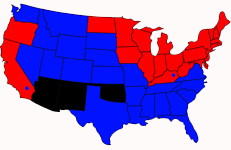Election 1896: War of the Words
When you hear William McKinley, if it rings any bells, you’re thinking of the big mountain in Alaska. When you hear the name William Jennings Bryan, if it’s familiar at all, you think of the raving lunatic from “Inherit the Wind.” What you probably don’t know is in 1896, these men forever changed presidential politics in this country.
The Contenders

Former Governor William McKinley (Republican-OH) – McKinley was nothing short of a political genius. He loved helping people, and as a Congressman in 1890, he pushed through the largest tariff in American history, so he could help American manufacturing flourish. Unfortunately, the McKinley Tariff basically caused the Panic of 1893. For any lesser man, that would have been the end of his political career.
Former Congressman William Jennings Bryan (Democrat-IL) – Bryan was the most awe inspiring orator of his age. He took his magic voice out for a spin and became the most ardent supporter of the free coinage of silver. (What the fuck does that mean?) At the 1896 Democratic Convention, he denounced the gold standard in his famous “Cross of Gold” speech, which catapulted him from convention speaker to presidential nominee. So wide was the support for “Bimetallism” that Bryan also won the nomination of the Populist and Silver Republican Parties.
The Fight
Still reeling from the Panic, the people were looking more and more to the government for solutions. Gold vs. Silver vs. Bimetallism, High vs. Low tariffs, Isolationism vs. Expansionism, no party could decide on their platforms. Even though the Democrats went with silver-supporting Bryan, an entire faction of Gold Democrats wanted to re-nominate President Cleveland. McKinley and Bryan, though, made their stances known, and the next step was to convince the voters, one at a time if necessary (and it was).
Newspapers wrote off Bryan’s candidacy as a joke. At 36, he remains to this day the country’s youngest presidential candidate, and his wild style earned him the reputation as a demagogue. From the convention to election, he got on a train, going town to town, sometimes giving 5 speeches a day, speaking to everyone possible. His youthful energy and preacher style enraptured and convinced everyone in attendance. This seems like nothing now, but that was the first time a candidate did that.
The Republicans still ran the campaign old school. They were much better funded, and they sent out engrossing speakers, like Theodore Roosevelt, to support McKinley and push Bryan’s bat shit crazy image. McKinley went out on his front porch to deliver a speech nearly every day. Unlike Bryan, McKinley’s speeches translated nicely into the printed word. People read newspaper stories and flocked from all over the country to hear him speak.
 For the first time, a presidential campaign wasn’t just about songs and party platforms. The two candidates, their personalities and their politics, became the real focus of the race, and it worked. With a nearly 80% voter turnout, even though Bryan lost to McKinley, he still received more single votes than any winning candidate before him.
For the first time, a presidential campaign wasn’t just about songs and party platforms. The two candidates, their personalities and their politics, became the real focus of the race, and it worked. With a nearly 80% voter turnout, even though Bryan lost to McKinley, he still received more single votes than any winning candidate before him.
The Title
The economy picked up, and the McKinley presidency quickly became about something else entirely. Although he denounced war and imperialism in his first inaugural, circumstances of the changing world led President McKinley to start expanding territories into Hawaii, Puerto Rico, and the Philippines. Starting with the Spanish-American War, McKinley expanded the role of the presidency and ushered in the Progressive Era.
Bryan unsuccessfully tried to take down McKinley in 1900, and then lost again to Taft in 1908. As his stances became more indecisive, he never again won an election, but his far-flung brilliance arguably inspired many of the ideas behind the Progressive Era: Imperialism, Women’s Suffrage, Prohibition, popular election of Senators, and most infamously, Income Tax.
When the Taft administration basically killed the Progressive Era, it was any man’s game.
Next Up - Election 1912: Beware the Bull Moose
The Contenders

Former Governor William McKinley (Republican-OH) – McKinley was nothing short of a political genius. He loved helping people, and as a Congressman in 1890, he pushed through the largest tariff in American history, so he could help American manufacturing flourish. Unfortunately, the McKinley Tariff basically caused the Panic of 1893. For any lesser man, that would have been the end of his political career.
Former Congressman William Jennings Bryan (Democrat-IL) – Bryan was the most awe inspiring orator of his age. He took his magic voice out for a spin and became the most ardent supporter of the free coinage of silver. (What the fuck does that mean?) At the 1896 Democratic Convention, he denounced the gold standard in his famous “Cross of Gold” speech, which catapulted him from convention speaker to presidential nominee. So wide was the support for “Bimetallism” that Bryan also won the nomination of the Populist and Silver Republican Parties.
The Fight
Still reeling from the Panic, the people were looking more and more to the government for solutions. Gold vs. Silver vs. Bimetallism, High vs. Low tariffs, Isolationism vs. Expansionism, no party could decide on their platforms. Even though the Democrats went with silver-supporting Bryan, an entire faction of Gold Democrats wanted to re-nominate President Cleveland. McKinley and Bryan, though, made their stances known, and the next step was to convince the voters, one at a time if necessary (and it was).
Newspapers wrote off Bryan’s candidacy as a joke. At 36, he remains to this day the country’s youngest presidential candidate, and his wild style earned him the reputation as a demagogue. From the convention to election, he got on a train, going town to town, sometimes giving 5 speeches a day, speaking to everyone possible. His youthful energy and preacher style enraptured and convinced everyone in attendance. This seems like nothing now, but that was the first time a candidate did that.
The Republicans still ran the campaign old school. They were much better funded, and they sent out engrossing speakers, like Theodore Roosevelt, to support McKinley and push Bryan’s bat shit crazy image. McKinley went out on his front porch to deliver a speech nearly every day. Unlike Bryan, McKinley’s speeches translated nicely into the printed word. People read newspaper stories and flocked from all over the country to hear him speak.
 For the first time, a presidential campaign wasn’t just about songs and party platforms. The two candidates, their personalities and their politics, became the real focus of the race, and it worked. With a nearly 80% voter turnout, even though Bryan lost to McKinley, he still received more single votes than any winning candidate before him.
For the first time, a presidential campaign wasn’t just about songs and party platforms. The two candidates, their personalities and their politics, became the real focus of the race, and it worked. With a nearly 80% voter turnout, even though Bryan lost to McKinley, he still received more single votes than any winning candidate before him.The Title
The economy picked up, and the McKinley presidency quickly became about something else entirely. Although he denounced war and imperialism in his first inaugural, circumstances of the changing world led President McKinley to start expanding territories into Hawaii, Puerto Rico, and the Philippines. Starting with the Spanish-American War, McKinley expanded the role of the presidency and ushered in the Progressive Era.
Bryan unsuccessfully tried to take down McKinley in 1900, and then lost again to Taft in 1908. As his stances became more indecisive, he never again won an election, but his far-flung brilliance arguably inspired many of the ideas behind the Progressive Era: Imperialism, Women’s Suffrage, Prohibition, popular election of Senators, and most infamously, Income Tax.
When the Taft administration basically killed the Progressive Era, it was any man’s game.
Next Up - Election 1912: Beware the Bull Moose
Labels: elections, Politics, presidents





 This blog is not to be taken seriously. Seriously. I take this seriously, but you shouldn't. You should do what you want, but you'll probably enjoy this more if you don't take anything I say seriously. I mean, I mean what I say, but it's not serious. Oh also, swearing is hilarious. It shouldn't be, but it is.
This blog is not to be taken seriously. Seriously. I take this seriously, but you shouldn't. You should do what you want, but you'll probably enjoy this more if you don't take anything I say seriously. I mean, I mean what I say, but it's not serious. Oh also, swearing is hilarious. It shouldn't be, but it is.


0 Comments:
Post a Comment
Subscribe to Post Comments [Atom]
<< Home